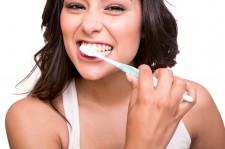
Patients ask if there is such a thing as brushing too much. The truth is that even a good thing can be done to excess. Various factors are involved in deciding how much is too much, and these are discussed in this article.
Sacramento, CA, June 20, 2017 (Newswire.com) - Brushing your teeth every day is recommended by the dentists at the Sacramento Dentistry Group. But can you brush your teeth too much? The answer is yes, excessive brushing does damage the teeth.
I Can Brush Too Much?
Excessive tooth brushing creates at least two common complications. First, overbrushing leads to irritated gums. Irritated gums get inflamed and then recede. This eventually leads to root exposure, decay and tooth loss. Secondly, almost all toothpastes contain some abrasives to encourage plaque and stain removal. But even mild abrasives start to wear away significant portions of enamel if they are applied too often throughout the day. Add in the use of an electric toothbrush and enamel can quickly be worn away beyond the body’s ability to replace it.
How Much is Too Much?
The question of when a person is going overboard depends in part on two things: 1) how abrasive is the toothpaste and 2) is the toothbrush manual or electric? Whitening toothpastes are especially abrasive and should probably not be used beyond twice a day. The less abrasive the toothpaste, the more it can be used without damage. As for toothbrushes, while an electric toothbrush is recommended for ordinary usage, combine it with obsessive toothbrushing and the hundreds of RPM far exceed what can be done by hand. With toothbrushing, there simply comes a point when a patient is no longer cleaning, but actually destroying.
So How Often Should I Brush?
The American Dental Association recommends brushing twice a day for two minutes each time. Flossing is recommended once per day, usually before going to bed. Additional brushing and flossing after meals is fine, but beyond this becomes excessive. Also, brushing immediately after drinking or eating acidic beverages and foods is guaranteed to damage the teeth by etching them with acid. Simply rinsing the mouth with water or chewing sugarless gum after consuming such things is sufficient until the saliva has neutralized the acid, usually after twenty to thirty minutes.
During semi-annual visits to the dentist, it is readily apparent if a patient is overbrushing. Always follow the recommendations of health professionals if they suggest reducing the amount of daily brushing. For most people, that would be a welcome change in their routine!
Source: Sacramento Dentistry Group
Share:
